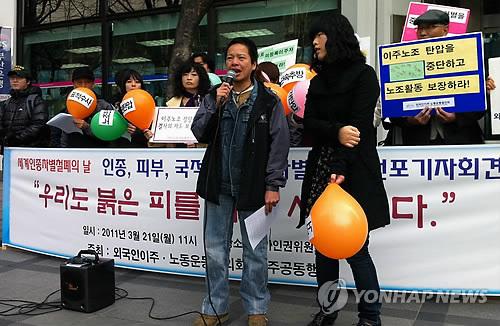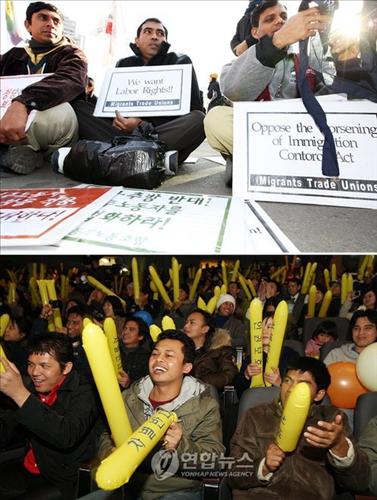Petitions of racial, religious discrimination double in 5 years
The number of petitions filed against racial and religious discrimination doubled in South Korea last year from five years earlier amid an increasing foreign proportion of the population, the human rights watchdog said Tuesday.
The National Human Rights Commission (NHRC) said a total of 64 cases of complaints were lodged in 2010 regarding discrimination on the grounds of race, religion, nationality, ethnicity and skin color, doubling from only 32 cases filed in 2005.

The issue of racial discrimination against foreigners, particularly migrant workers from developing countries, has drawn fresh attention here, as Norway's massacre madman Anders Breivik was found to have expressed racist hatred in his diary before murdering more than 70 people over the weekend.
According to the NHRC, complaints against mistreatment based on race reached 12 cases last year, registering a two-digit figure for the second straight year. Until 2008, there were fewer than 10 corresponding cases per year, it said.
In 2010, 27 petitions were filed based on unfair treatment regarding nationality, up from 17 in 2009, the NHRC noted.

The total complaint tally for 2010 also includes 18 cases of discrimination inflicted due to a different religion, said the agency, which arbitrates between discriminators and victims or formally reports discrimination cases to authorities.
The growth in reported discrimination comes as an increasing number of foreigners are living in South Korea, widely known as a homogeneous country. Currently about 1.26 million foreign nationals reside here, accounting for more than 2 percent of the country's total population.
An inflow of foreign workers coming to take up mostly manual jobs as well as overseas brides have lately resulted in a sharp growth in the foreign population here.
Still, mental adjustment lags far behind the change in the composition of the population, civic activist said.
"It was a shame that the Norwegian terrorist cited Korea as an ideal place," said Oh Chang-ik, an executive of a civic human rights group, referring to Breivik, who mentioned Japan and South Korea as ideal nations that eschew multiculturalism. "The citation indicates our society lacks respect for other cultures."
Multiculturalism tends to form a link with people from less-affluent countries as the word came to the forefront amidst an influx of Chinese, Mongolians and Southeastern Asian country workers, Shin Young-sung, an official of the Korea Multicultural Association, said. "We need to make efforts to introduce and understand the great cultures from such countries," Shin said.



Post a Comment